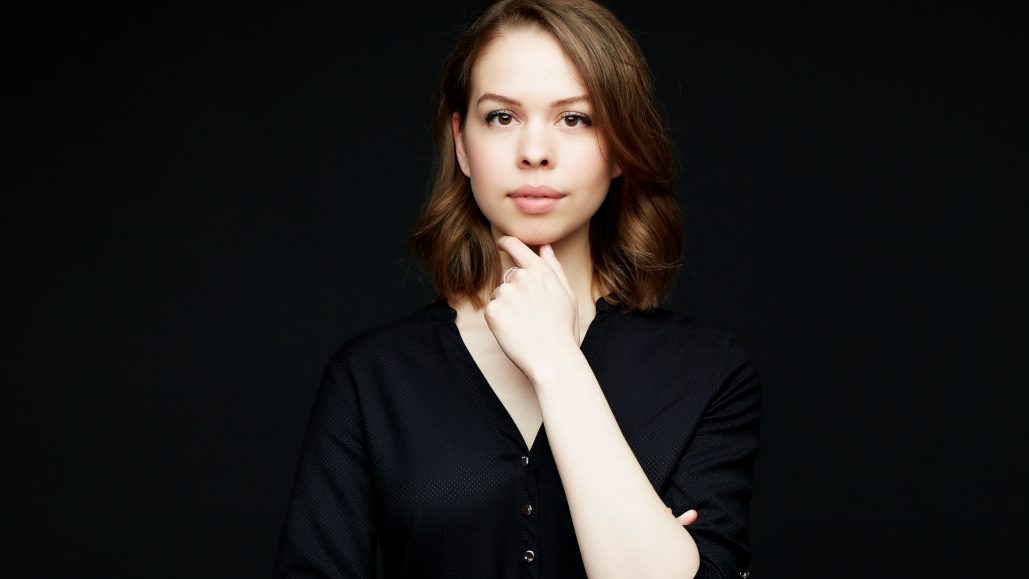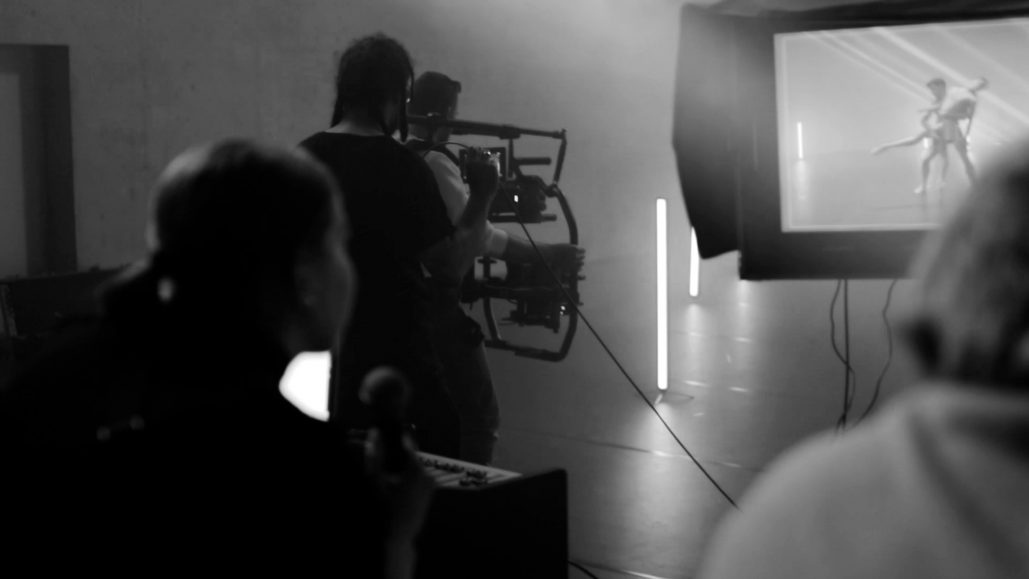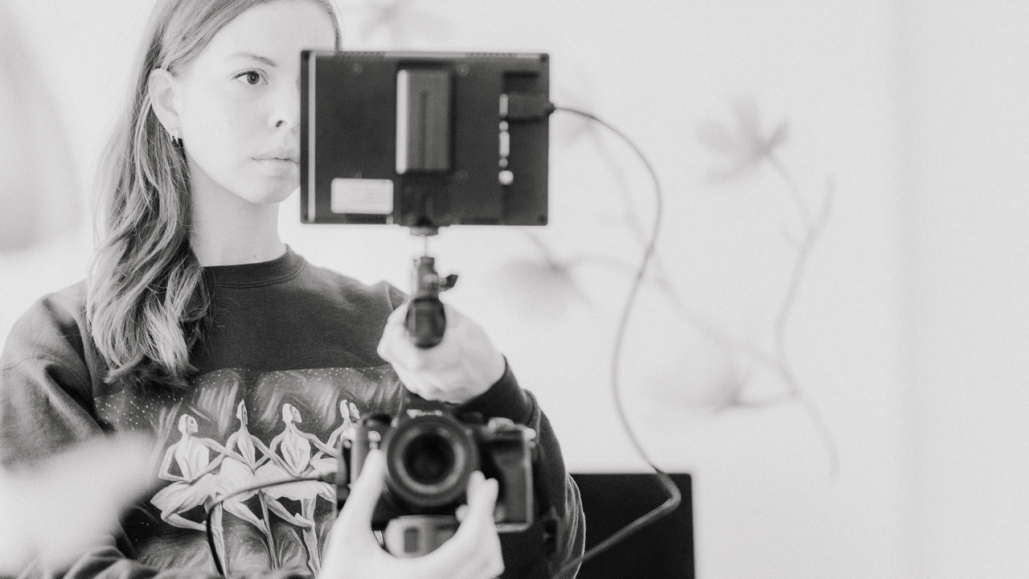Behind the scenes with Nicole Davidson
Interview with Nicole Davidson
Not many people can say they've sung in the children's choir, worked as a live camera operator, and checked the coats at the Zurich Opera House. But thanks to her family links and an enduring passion for the arts, Nicole Davidson can say just that.
After starting ballet dancing aged four, following in the footsteps of her older sister, Nicole has never looked back. For a while in her teens she took dancing very seriously, but instead of going professional, she chose to pursue her studies and her other passion of videography. However, with an opera singer as a father and a love for the arts that has never dimmed, it's no surprise that she has managed to fuse her love of film with the world of dancing. Since graduating from the SAE Institute, Nicole has produced a range of dance films in Switzerland, some of which have been shown at festivals overseas.
Here's her story of what happens when the dancers on stage meet the lights, camera, and action of the film industry…
Q: What were your experiences of the Zurich Opera House growing up?
The Zurich Opera House has been a second home to me. Over the years, I’ve got to know so many things from different perspectives both off and on stage. I’ve done an internship as an assistant director, worked as a live camera operator for a production, and even worked at the coat check for shows – this was a student job that allowed me to save up for my first camera. I've seen almost every corner of the Opera House and had the opportunity to sing above the chandelier in the auditorium where the Phantom of the Opera would be hiding! These days I'm part of the Association Statistenverein, so I still take part in stage performances at the Zurich Operahouse as an extra.
Q: Do you have a favourite choreography?
There’s not a particular choreography that springs to mind because I just loved dancing in general. At school, we’d have a recital every year in the summer so we would spend time every Sunday learning a choreography. When you’re young, it feels like such a big deal even though in the end you're only on stage for five minutes!
I had a strong passion for dance but guess it wasn't a great option to pursue a serious academic education simultaneously.
Nicole Davidson, Filmmaker & Photographer
Q: Did you consider becoming a professional dancer?
I've never danced professionally and out of respect for professionals, I wouldn't refer to myself as a dancer. But I still dance recreationally. As a teenager, I really seriously considered going into it professionally. However, at that time in Switzerland there wasn't a great option to pursue a serious academic education simultaneously. I had a strong passion for dance but guess it wasn't strong enough to sacrifice a good education. So I decided to pursue my studies first and see where that took me. I’ve always continued to dance and to this day, I try to go once a week and take an open class.
Q: In your opinion, what makes a good dancer?
I think the easiest, most straightforward answer would be great technique and a great body for dance. I'm really fascinated by people who have such a strong charisma that they can step on stage and your eyes are immediately drawn to them. That is a very rare gift and when you see a dancer who has that, it's really quite amazing.
Q: How did you discover your passion for the world of theatre and film?
I've always loved watching movies. I love going to the cinema. It’s such a nice way to experience a different world and forget your day-to-day life. You get to live a different life through characters on the screen for an hour or two. I'd experienced theatre and ballet up close, so film was the last thing for me to learn about. That's why I decided after high school that I really wanted to delve into that and learn more about it and my passion just kept growing from there. I studied film for three and a half years in Zurich at the SAE Institute, a partner of Middlesex University in London. It was very hands-on, I learned everything from being a camerawoman to lighting, editing, and visual effects.
Q: What are your favourite films?
One that comes to mind spontaneously is the King's Speech. I also love the French film Intouchables. I enjoy cheesy, feel-good musicals - I'm into a wide range of genres. In general, I’m more into art-house movies than blockbusters.
Q: What can you tell us about your film-making work?
I do freelance work. Something that's a bit unusual about the way I work is that I'm a one-person crew, I do a lot of projects on my own. I'm also employed as a video journalist at ETH Zurich, which, I always tell people, is where Einstein studied! Over the years, my film making has improved a lot. It's very important for me to take the initiative and ask people to do projects.
I've always tried to do things that aren't required of me but help me to improve my skills. During my studies, I always did things unpaid. Usually if money was involved, I was the one investing in the project! Now I’ve graduated, and could be considered a professional, it still feels weird to demand the pay of an actual film-maker. I’m very picky with my own work, I always see stuff I could improve, so it's a mindset I’m trying to get rid of.
As far as the dancer is concerned, the big difference between stage and film is that you don't have to project emotions and facial expressions as much on camera.
Nicole Davidson, Filmmaker & Photographer
Q: What do you think makes a good dance performance on video?
As far as the dancer is concerned, the big difference between stage and film is that you don't have to project emotions and facial expressions as much on camera. When you're on stage, you have people in the audience who could be quite far away, so they need to be able to see your acting to know what's going on. It's a similar difference with theatre and film actors. On camera, you can be a lot more subtle, real and authentic with your expressions and emotions. That's sometimes difficult for dancers to adapt to at first because they're so used to these big emotions and expressions on stage. Dancers are good actors, though, so usually they adapt well, but in my opinion that’s one thing that makes a good dance performance on video.
Q: How do you incorporate your knowledge of dance into your work as a film-maker?
I know what good dance technique looks like, I know which angles and positions look good, and which angles to avoid. For example, a photographer who usually does a great job but has never danced before will maybe capture a jump and think 'Oh, I got the jump in the air and it looks great'. But there are details that you also have to pay attention to, like the lines of the dancers, whether they're pointing their toes, and how their arms look. If you’ve danced yourself, you know what these things are supposed to look like. If you haven’t, it’s a lot harder to judge what actually looks good and what doesn’t.
Q: How satisfying is it to be able to combine your passions of dance and video production?
It's the best of both worlds, really. I still get to live this passion of dance, but in a different way. I also get to live out my other passion which is film-making, so it's a great combination. It's also a really nice way to stay in touch with the arts. I hope to never have to give that up and be able to keep creating dance films.
On video, it's archived and people will see it forever. I think dancers feel that pressure a lot when they're on camera.
Nicole Davidson, Filmmaker & Photographer
Q: What are some of the challenges of filming dance routines?
It’s important during the preparation to actually see the choreography in advance. I can only really do a piece justice if I watch it first. It allows me to think about how I can break it down into shot types and which angles would be good.
During production, a challenge for dancers – and they’ve told me this – is that they much prefer to dance on stage than on camera. On stage, they have the adrenaline from the audience. Even if something goes wrong, its’ just a fleeting moment. OK, so there was a little imperfection, but most people probably don't notice and they can just keep going on with the choreography. On video, it's archived and people will see it forever. I think dancers feel that pressure a lot when they're on camera.
The other thing is that they know they can do multiple takes, so sometimes rather than continuing to dance, they'll just stop. It can be a lot of starting and stopping. It's also difficult as you have to find the right balance. On the one hand, you understand they want to save their energy, but also you don't want them to stop so much that it influences the quality of the final film.
Q: And what about the editing process and post-production?
Obviously, dancers aren’t robots and aren’t going to move the same way every time. Sometimes if the musicality or the way they execute the choreography isn’t super-precise, if I’m shooting from different angles and need to connect them, it can be difficult if say in one take the arm is above the head, and in the next one it’s in a different position.
I’ve experienced this with past productions. I had a final result where the choreographer wanted something and the dancers wanted something else. The big issue is that they’re all looking out for themselves and I’m trying to keep the film as a whole and make it work.
As far as the final film is concerned, I try to look at the film as a whole. I have the feeling that when dancers watch themselves, they’re not so concerned with the whole picture, but more interested in how they look. Then you have the choreographer who wants to make sure the choreography is being shown well, so it’s a challenge to make everyone happy.
Q: Is it difficult to recreate the 'moment' of a dance performance on film?
Most dancers I work with are really professional. I've never experienced it being a challenge to get 'that feeling'. I think the biggest thing for the dancers is the mental aspect of not having an audience and having the chance to repeat things over and over, but as far as their performance goes I think they adapt quite well.
That was a passion project – one of those where I didn't get anything out of it financially but really wanted to do it and it was so great collaborating with the artists.
Nicole Davidson, Filmmaker & Photographer
Q: What are some of your favourite projects you've worked on?
The first project that comes to my mind is the very first documentary I filmed for school called 'Stages'. It followed the life of four dancers at different stages of their careers, including a very young child, an older teenager, someone just starting their professional career, and a soloist who was starting the transition of retiring and going into choreography.
That project taught me so much not just technically, but it was also so inspiring to work on. It's also the first project that I shot using the camera I bought with the savings I made from working at the Opera House so it felt full circle. Another project that was important for me was 'Passion and serenity'. It was a short film with two dancers from the junior ballet at the time. It was choreographed by Filipe Portugal, who was also in Stages, who I really love to work with. That was a passion project – one of those where I didn't get anything out of it financially but I really wanted to do it and it was so great collaborating with the artists.
It was one of the few projects where I also had classmates helping me with filming and doing lighting, so it was a really great team effort and I was really happy with the result. Something I did more recently was a collaboration with VOCES8 a British acapella choir. They did a concert called 'Live from London' during the pandemic. I got to film some videos that were screened during the concert. I was a fan of the group before, so it was a cool and unexpected surprise to get to film something for them.
Q: What are your hopes and aspirations for the future?
Mostly just trying to stay creative and never give that up. I really hope I keep this mentality of taking the initiative and going for things, even if it's just for fun. For me, it's important to keep an open mind, try different things and not be so stuck on one idea that I miss out on the rest.



